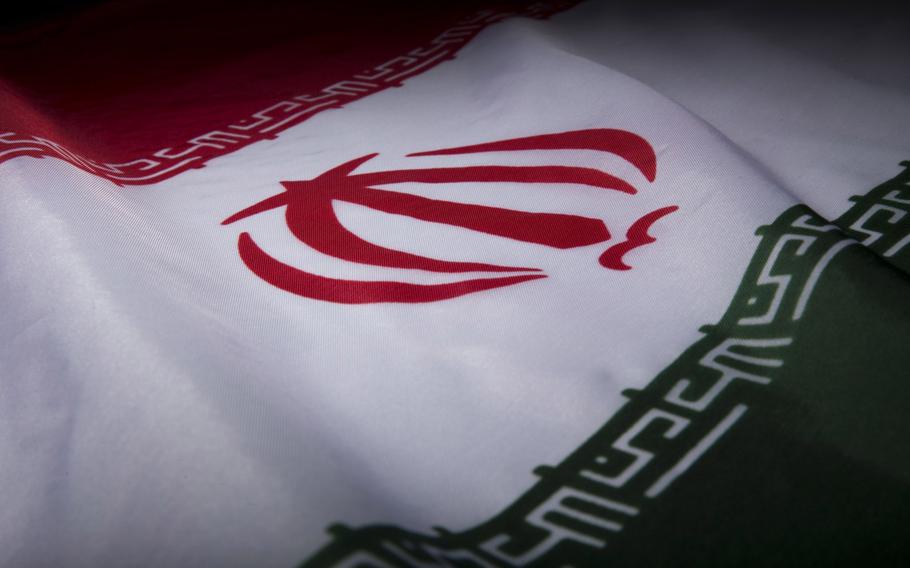
The Iranian flag. (Scott Eells/Bloomberg)
Most of the time Maj. Gen. Hossein Salami, the head of Iran’s Islamic Revolutionary Guard Corps, is known for his aggrandized statements or bravado regarding Tehran’s achievements and prowess. But recently he shared a public statement that was rather revealing. While addressing the commanders of paramilitary Basij forces, he explicitly expressed concern about the possibility of resurgent unrest around the anniversary of the incident that sparked a nationwide, anti-government uprising last year.
On Sept. 16, “morality police” in Tehran violently apprehended Mahsa Amini. Eyewitnesses reported that the 22-year-old was beaten about the head and soon fell unconscious, leading to her death in a hospital three days later. Her funeral was followed by mass protests that quickly grew to explicit calls for regime change.
Some of the uprising’s defining slogans were attributed to the activity of a network of “resistance units” that has been growing throughout the Islamic Republic, under the banner of the leading pro-democracy opposition group, the People’s Mojahedin Organization of Iran. The role of the PMOI, or MEK, has gradually attracted more public attention from regime authorities, and was even acknowledged last week by the speaker of the Iranian parliament, Mohammad Bagher Ghalibaf, who is also a former commander in the ultra-hardline IRGC.
Of course, he and his colleagues have generally sought to downplay the significance of the opposition, frequently describing the nationwide uprising as a collection of “riots” that did not truly represent popular sentiment. But as is evident from the proliferation of the resistance units, it is increasingly clear that the organized opposition movement enjoys broad support among the Iranian people. This is what elevated the latest uprising into the greatest challenge to the theocratic dictatorship since its inception in the wake of the 1979 revolution.
And some in Washington are taking note. A resolution introduced to the U.S. House of Representatives, with 36 co-sponsors from both political parties last week, specified that the protests, which have been ongoing since September, “are rooted in the more than four decades of organized resistance against the Iranian dictatorship.” It also credited the largely women-led protests with enduring “torture, sexual and gender-based violence, and death,” thereby persisting to the very brink of their one-year anniversary.
The Iranian authorities are finding it increasingly difficult to control the narrative of the uprising. So, to compensate, Tehran has resorted to a campaign of violent repression and public intimidation that has seen more than 400 Iranian prisoners executed in just the first seven months of 2023.
As the United Nations Human Rights Council has established a commission of inquiry into the repression of dissent following Amini’s killing, the House resolution urges the U.N. body to expand that inquiry to address a wider range of Iran’s unresolved human rights abuses and crimes against humanity, including its massacre of possibly as many as 30,000 political prisoners, most of them MEK members, in the summer of 1988. Current Iranian President Ebrahim Raisi played a key role in the 1988 massacre as deputy prosecutor for Tehran.
Until two years ago, no one had ever been held accountable for the killings, but new ground was finally broken on this issue when Sweden used the principle of universal jurisdiction to prosecute a former Iranian prison official, Hamid Nouri, who had helped to implement some of the capital sentences handed down by Raisi’s “death commission.”
The Iranian officials are currently trying to stretch and manipulate the concept of universal jurisdiction, having recently announced indictments for 104 officials and affiliates of the MEK who do not reside in Iran and who are generally long-time residents of Western nations.
Alarmingly, on June 20, the Albanian police raided a compound that has been maintained in the country for years, as a home to around 3,000 MEK activists.
Now, there is growing concern about that community’s safety and security, while Tehran’s overall focus on expatriate activists raises similar concern about communities throughout the world.
The House Resolution on Iranian protests and crackdowns “calls on the United States Government, in cooperation with our ally Albania, to ensure the full protection of the Iranian political refugees in Ashraf 3 in Albania and for them to benefit from all rights stipulated in the Geneva Convention 1951 and the European Convention on Human Rights, including the right to life, liberty, and security, and protection of property, as well as freedom of expression and assembly.”
Similarly, Senate Foreign Relations Committee Chairman Robert Menendez used a recent hearing on State Department appointments to ask that the prospective assistant secretary of state for European and Eurasian Affairs “commit to advocating for the fundamental rights and freedoms of the residents of Camp Ashraf.”
Menendez added that this is important because “if you seek refuge, you ultimately have to be in a position to know that refuge is secure.” This is true under any circumstances but is especially important at a time when any denial of refuge to Iranian exiles poses such a clear threat to their lives.
It is incumbent upon the international community to protect the people inside Iran who are still fighting to overturn a repressive theocracy. But it should not allow the Iranian regime’s tentacles reach beyond its borders and should guarantee safeguarding those who are beyond the regime’s reach.
In line with the bipartisan House resolution, as the anniversary of the uprising is approaching, the U.S. government and all its major allies must take immediate action to fend off Tehran’s growing attacks on human rights defenders, including offering explicit guarantees of inalienable rights to the residents of Ashraf 3 throughout the world.
Ted Poe represented Texas' 2nd Congressional District in the U.S. House of Representatives from 2005 to 2019, where he served on the Committee on Foreign Affairs and as chairman of the subcommittee on terrorism, nonproliferation and trade.